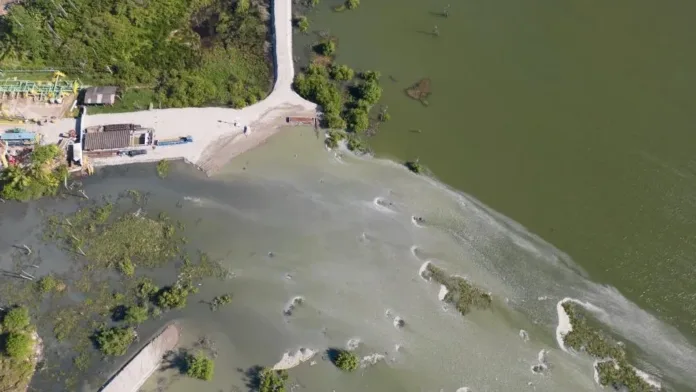A break at a rock salt mine in north-eastern Brazil has made people more worried that the whole mine might collapse soon.
A video taken by the civil defence authority showed dirty water bubbling up in the Mundaú lagoon near the city of Maceió, where the mine is located.
The mine was closed and it belonged to a big company from Brazil called Braskem.
In the last 40 years, many people have been forced to leave their homes because the rock salt mining has caused a lot of damage.
The break in the mine happened at 13:15 local time (16:15 GMT) on Sunday, which let water from the lagoon get inside.
The mayor said the area impacted was 60 meters wide.
Braskem said that cameras watching the area around Mine 18 saw something strange happening with the water in the lagoon’s ground.
The mayor of Maceió, João Henrique Caldas, flew in a helicopter to look at the damage in the lagoon.
He said there was a break in the ground about 60 meters (200 feet) wide, but it didn’t put anyone in danger because the people who lived nearby had already left.
He said that the mine was supposed to become stable.
However, people who live in the city are worried about how quickly the ground above the mine is sinking.
The ground sank 2. 35 meters between November 30th and December 10th, according to official measurements.
Maceió’s civil defence office said on November 29th that Mine 18 might collapse soon, but the city has had issues with rock salt mining for a long time.
In 2018, cracks started to appear in the buildings and roads of five neighborhoods. In the past five years, more than 14,000 buildings had to be emptied, and about 60,000 people were affected.
The damage was first thought to be caused by strong rain and shaking of the ground. In 2020, a government study found that Braskem’s rock salt mining caused cracks and the ground to sink.
For many years, the Brazilian petrochemical company has run many mines in the area.
Rock salt is taken from deep underground and used to make PVC. When it’s removed, it can leave holes that make the soil sink.
Braskem disagreed with the results of the study done by experts from the Brazilian Geological Service, saying they were not accurate.
However, the company shut down its mines in Maceió in 2019 and recently agreed to pay the city 1. 7 billion reias ($343 million; £273 million) for damages caused by land sinking and relocation.
The town leaders want to talk to the company about paying for more things if the mine collapses.
